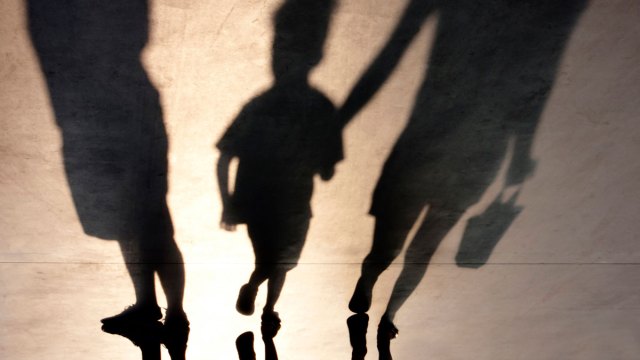You might call it the “D” word—divorce. Many children are blessed to be overwhelmingly loved by two caring adults who are able to cohesively co-parent. Then there are some children, like my own, who are not only left in turmoil but are also left with an absentee parent.
The father of my first two children could be summed up as a slow-motion train wreck. There is too much to go into great detail about, but his biggest flaw is choosing to be the equivalent of a distant cousin as opposed to a father: going weeks and even months without contact, missing birthday phone calls and falling about two years behind on child support payments.
Seeing the heartache on my children’s faces prompted me to become the Queen Mother of Overcompensation. I now had to step into their father’s shoes. I had to make up for all that he was screwing up.
At first, it was harmless: trying to make sure I fulfilled every wish on the birthday and Christmas list. I mean, how couldn’t I? How could I make his lack of financial or emotional help be the fault of a child?
Next came the emotional compensation, choosing to ignore problematic behaviors simply because of the pain the kids were feeling due to the loss of a family unit. I can remember the day my then-third grader leveled a classroom following an angry encounter with his teacher. I remember being terribly embarrassed and expressing that to every faculty member in view, but moments later, taking him for ice cream to talk it out.
I was afraid of being the “bad parent.” That if my children saw me put my foot down, they would hate me. I feared they would want and long for the one who wouldn’t even take the time to pick up the phone to return a call. I had to be all they needed wrapped in one. Believe it or not, I needed their love during this difficult time as much as they needed mine. I was afraid to parent my own children.
As I continued this path of destruction, I slowly began to realize that my pattern of enabling them was like putting scotch tape on a leaky pipe; sooner or later, that tape slides off, and the real problem bursts through. The gifts and the ice cream didn’t stop the anger and only calmed the raging storms. The phone calls from school didn’t stop. The ADD/ADHD diagnosis came next, which led to bigger, more underlying issues being discovered. My children were in pain, and no toy could fix that. More needed to be done!
I had to recognize my own toxic behavior in being my children’s enabler. The naysayers were right—they needed love, yes—but they also need guidance and a strong mother who stood firm in her decisions and who wouldn’t waffle at their whimpering. They needed a mother who was confident enough to know that she could never fully fill the void of their absent father.
I also had to acknowledge that I, too, was in pain. Divorce is never easy for children, but for the parties who vowed to spend the rest of their lives together, it was devastating. I cried myself to sleep some nights, afraid to face the world as something I never wanted to be. I was now a single mother and, most of all, alone. Loneliness eats away at you, and I longed to fill the void.
As these thoughts came rushing over me, I realized what I was doing to myself. Trying to overcompensate for someone who couldn’t care less was like ordering a Big Mac with a Diet Coke—it made no sense. I was an emotional wreck and I was passing that disease to my own children. I had to make a choice. I had to decide if I wanted to continue to fill the emotional loss with worthless items or if I wanted to help my children heal.
I wanted them to heal, so I had to hold myself and them accountable for our poor choices.
Part of that process meant allowing my children to talk it out with someone other than myself. The school counselors were amazing in this transition; my boys opened up and let them into their safe zone. They were given strategies to deal with anger and to calm themselves. They began talking more about missing their father and how it made them feel that he rarely fulfilled his role. While these were steps in the right direction, the healing process takes time. We continue to take it step by step and remember that we are in it together.
I know that we are not all lucky enough to have the perfect co-parenting scenario, though that’s what we all want for our children. In the event that we don’t get that happy ending, understanding that we are in charge of guarding our children’s emotional healing—and proceeding carefully and responsibly—is key.
Originally published January 2019.
RELATED LINKS
When Divorce Is the Only Answer
Dear Husband: I Need More Help from You
My Child with ADHD Needs Kinder—Not Tougher—Parenting











